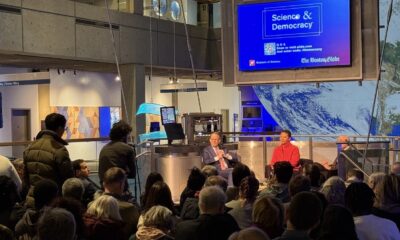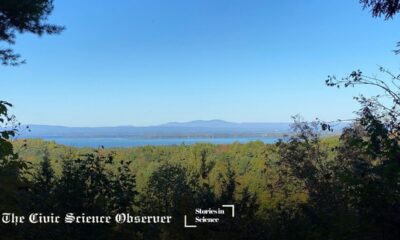Stories in Science Special Series
When Trauma Changes Your Life and Research
Prof. Dan J. Mallinson: “It can be difficult to change a research trajectory. We, especially in pursuit of promotion and tenure, are expected to present ourselves as a nice neat package. “This is who I am and what I do.”

Dan J. Mallinson
[su_boxbox title=”About”]Dr. Dan J. Mallinson is an Assistant Professor of Public Policy and Administration in the School of Public Affairs at Penn State Harrisburg. He studies how state governments learn from each other. He also studies drug and mental health policy. [/su_boxbox]
[su_boxnote note_color=”#c8c8c8″]Three Key Points
- Careers are not straight lines.
- It’s OK to change.
- Change is hard.[/su_boxnote]

Prof. Dan J. Mallinson
[dropcap]M[/dropcap]y career as a social scientist has been a winding road, not a straight one. I must have gone through five different desired careers, ultimately abandoning them all by the time I graduated from high school. My enjoyment of studying politics was ignited, though, by my high school government teacher, Mrs. Wetzel. She made government come alive for me, from founding documents to practical politics. I was a smart, but lackluster student in high school. The only course I pushed myself in was her AP American Government. My mom was very understanding during this whole process, she was supportive in me exploring what I really wanted to do.
By the time I finished my first semester as a political science major at Elizabethtown College, I was convinced that I wanted to be a college professor. I loved the academic environment, systematic inquiry into social phenomena, and exploring how politics and policy can be leveraged to better peoples’ lives. By the time I finished, I was set on pursuing a PhD in political science and studying international relations (because I loved to travel). Unfortunately, no PhD programs would take me, so it was on to working for government instead. This was another bend in the road. At the time, this was disappointing. But looking back, I am grateful. My entry into government came by working for the Pennsylvania Public Utility Commission (PUC). It opened my eyes to the ways in which state and local governments impact our daily lives, for good and for ill. It seemed far more tangible an impact than U.S. foreign policy.
Around 10pm on Saturday February 16, however, my world changed.
My greater motivation and focus, plus a master’s from Villanova, helped me in a second round of PhD applications. Ironically, I ended up at Penn State, which had rejected me two years prior. I set about building a portfolio of research on state government, environmental policy, and energy policy (influenced by my time at the PUC). My core interest has always been in why and how policies change, and the effects of those policies on people’s lives. But the specifics of what I study has evolved, just like my career path.
A major evolution came during my second year on the tenure track at Stockton University. I had been selectively applying for other positions while I was at Stockton, including schools in central Pennsylvania where we could move closer to my mom and my extended family. My mom was widowed when I was 13 and I am her only child. That meant that we also had Nana’s only (at the time) grandchild. We were only three hours away, but it was a tough drive around Philadelphia. Around 10pm on Saturday February 16, however, my world changed. I received a call from the Lancaster County coroner’s office that she died by suicide earlier that evening at my dad’s grave. She had struggled with depression for most of her life. The medication that typically helped was counteracted by antibiotics she was taking for strep throat.
To add to the devastation – just four days earlier – I had applied to Penn State Harrisburg (my current position), which is only 30 minutes away from the house where I grew up. I was asked for a phone interview during the week of the funeral, asked back for an on-campus interview shortly after spring break – when we traveled to Lancaster to start dealing with my mom’s estate – and had the job offer in early April. We were moving home, but my mom was gone. That year was a whirlwind of change that I am still coming to terms with two years later. Not only another bend in my career path, but a major bend in my life.
It can be difficult to change a research trajectory. We, especially in pursuit of promotion and tenure, are expected to present ourselves as a nice neat package. “This is who I am and what I do.” But part of my process of making meaning of my mom’s death, as well as other cases of mental illness in my family, was to start thinking about how I could incorporate mental health into my portfolio of work. I had already started an arm of my research on drug policy due to a great collaboration with a friend from graduate school. Now I am applying for grant funding for my first suicide prevention project in Pennsylvania. All of this has brought a radical rethinking about who I am as a researcher. This rethinking is evident when people ask me about my environmental and energy policy work.
I still focus on studying states – their politics, institutions, and policy – but the emerging unifying theme of my work is despair. I was struck at how that theme was already emerging in my work before my mom’s death. It is further emphasized with my moves into mental health policy and suicide prevention. There is an epidemic of despair in the United States, illustrated by the rise in suicides and overdose deaths. My central research questions are becoming where does despair come from? How does government policy contribute? How can government policy address despair and its results? I am greatly blessed but have also been touched by that despair. Largely in the wake of mom’s suicide. But her death brought its presence around me into stark relief. I now see it every day in headlines, tweets, and in conversations.
I often share my career path story with students to illustrate to them how winding careers can be. They do not need to have their life figured out at graduation. Life experiences – both those we choose, and those that are thrust upon us – will shape our path. I have also found this to be the case in my research as a social scientist. It is often our passions that bring us into science, into studying something very specific for our entire lives. But passions can change with life experiences. Granted, this may be easier for scientists in some fields than for others, but we should not be afraid of change, even if it is hard. And this change was hard. I didn’t ask for it, but I still seek to make meaning out of it through my work.
Image by Free-Photos from Pixabay.
Metrics
Sessions
Total number of Sessions. A session is the period time a user is actively engaged with the page.
Visitors
Users that have had at least one session within the selected date range. Includes both new and returning users.
Page views
Pageviews is the total number of time the article was viewed. Repeated views are counted.
The CS Media Lab is a Boston-anchored civic science news collective with local, national and global coverage on TV, digital print, and radio through CivicSciTV, CivicSciTimes, and CivicSciRadio. Programs include Questions of the Day, Changemakers, QuickTake, Consider This Next, Stories in Science, Sai Resident Collective and more.

-
 Audio Studio1 month ago
Audio Studio1 month ago“Reading it opened up a whole new world.” Kim Steele on building her company ‘Documentaries Don’t Work’
-
Civic Science Observer1 week ago
‘Science policy’ Google searches spiked in 2025. What does that mean?
-
Civic Science Observer1 month ago
Our developing civic science photojournalism experiment: Photos from 2025
-
Civic Science Observer1 month ago
Together again: Day 1 of the 2025 ASTC conference in black and white
Contact
Menu
Designed with WordPress
























